Malaysia has long been an important market for international student recruitment. Although the country had fallen off the top 10 global sending countries list by 2005, it remains an important source market and has continued to grow, according to a report by ICEF Monitor. Today, the market has become increasingly competitive and Malaysian students have a widening range of higher education choices - not only from international universities but also locally-based institutions.
How then can you position your university to successfully attract Malaysian students?
Based on our country expertise and targeted findings on prospective students from our International Higher Education Survey: Student Insights 2020, we have put together some key insights into Malaysian students’ motivations and concerns to help you tailor your recruitment strategy.
1. Diverse Backgrounds Present Market Opportunities
Due to their diverse cultural backgrounds, Malaysian students are less likely to limit themselves by country before looking at unique program and university offerings. This presents targeted opportunities for universities to position themselves in the Malaysian students’ recruitment market.
Our survey reports that Malaysian students demonstrate more flexibility in their country choice when deciding where to study abroad. Malaysian students have a lower prioritization of country choice (25%) than the average non-Malaysian student (32%).
Malaysian Students' Considerations
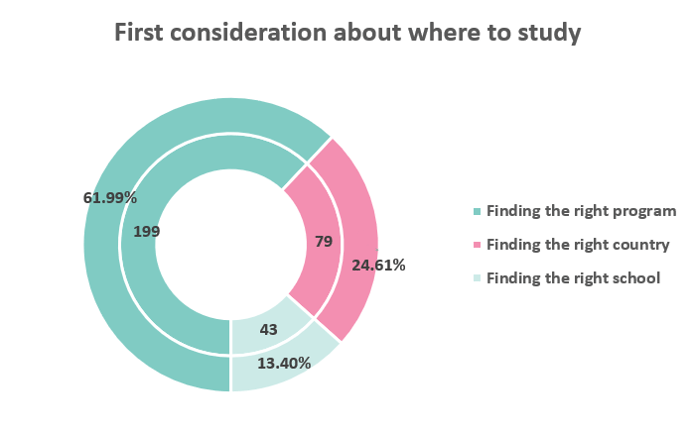
Global Students' Considerations (Excluding Malaysia)
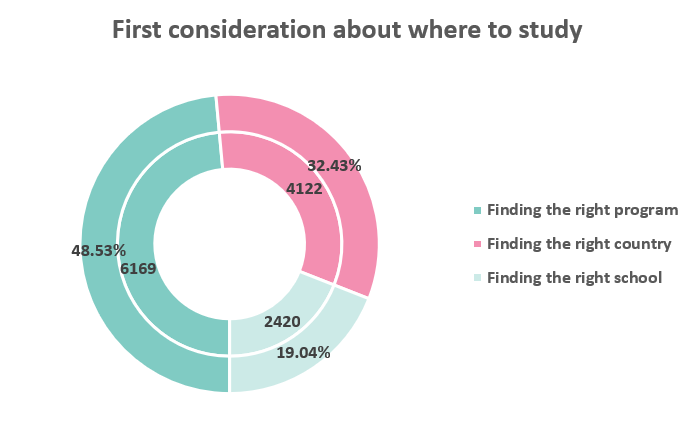
Source: International Higher Education Survey: Student Insights 2020
The finding on Malaysian students’ flexibility on country choice is supported by their diverse study destinations. Traditionally, three majority English-speaking countries (United Kingdom, Australia and United States) have dominated the international student recruitment market in Malaysia. However, a deeper look at the top 10 lists of study destinations for Malaysian students reveals some interesting trends.
Top 10 Destinations for Malaysian Students Studying Abroad
2014
(Number of Malaysian students studying abroad: 56,260)
-
United Kingdom (28%)
-
Australia (27%)
-
United States (12%)
-
Egypt (9%)
-
Russia (4%)
-
Japan (4%)
-
Jordan (4%)
-
India (3%)
-
New Zealand (3%)
-
Ireland (2%)
2010
(Number of Malaysian students studying abroad: 79,254)
-
Australia (26%)
-
United Kingdom (17%)
-
Egypt (11%)
-
United States (8%)
-
Indonesia (7%)
-
Taiwan (6%)
-
China (4%)
-
Russia (3%)
-
New Zealand (3%)
-
India (3%)
Source: Project Atlas
There is a growing trend towards studying in the Middle East in countries such as Egypt and Jordan. Majority Chinese-speaking countries like Taiwan and China are also popular destinations for certain segments of Malaysian students. Other than costs and increased competition for local university places, the diversity of study destinations could be at least partially explained by Malaysian students’ multicultural and multilingual backgrounds.
The location of Peninsular Malaysia along the Strait of Malacca – the main shipping lane connecting the Indian Ocean and the Pacific Ocean – means that Malaysia has a centuries-old history of being exposed to global trades and the diverse cultures that international traders brought with them.
This history and migratory movements have created a multicultural and multilingual society in Malaysia. Today, there are different types of schools in Malaysia that use different languages – Bahasa Malaysia (the national language), English, Mandarin or Tamil – as the primary medium of instruction. In addition, Bahasa Malaysia and English are compulsory subjects. Malaysian students are therefore often bilingual and some are even trilingual.
Malaysian students’ diverse language competencies and their comfort with a multicultural environment indicate that there are opportunities for universities from lesser-known countries to make inroads into the Malaysian market. This would require a careful study and segmentation of the market to understand what drives the diversity of study destinations.
Malaysian students’ flexibility on country choice is also a reminder to universities from traditionally dominant countries not to be complacent as newer and more innovative offerings are introduced by competitors.
2. Showcase International Students’ Lifestyle
Our survey finds that in contrast to the average non-Malaysian student, Malaysian students tend to privilege experiential motivators and access to higher quality teaching above career goals when deciding to study abroad. While achieving career goals is still an important reason, it ranks 5th (vs. 1st for the average non-Malaysian student) below:
-
To experience a new culture or lifestyle
-
To access higher quality teaching
-
To develop myself personally
-
To have an adventure
Malaysian Students' Top Motivators
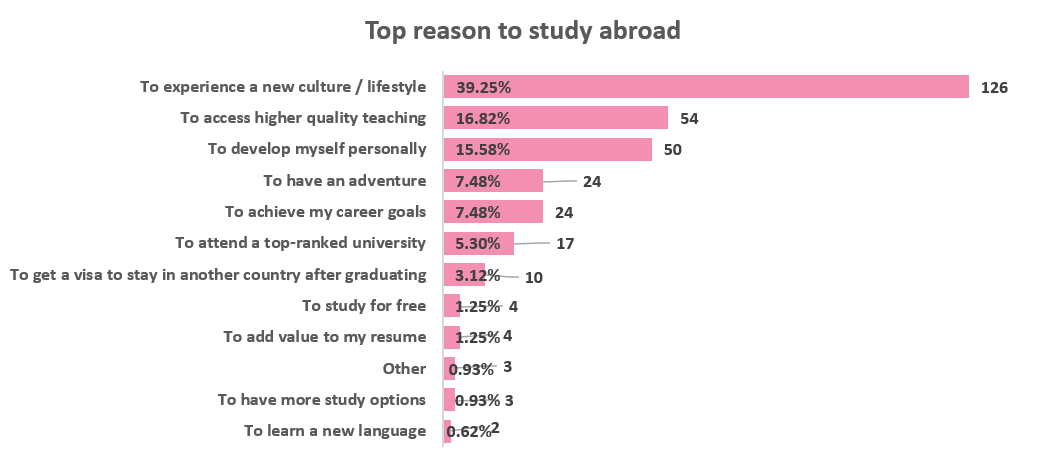
Global Students' Top Motivators (Excluding Malaysia)
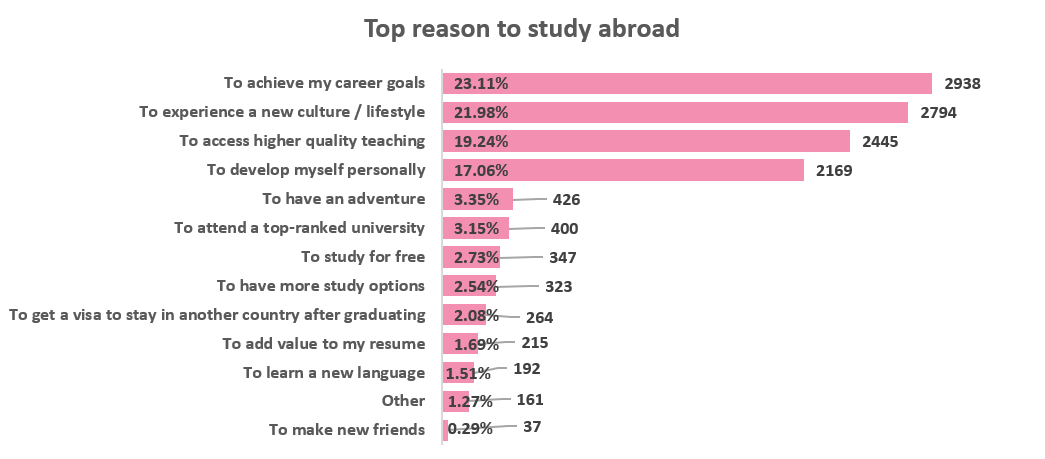
Source: International Higher Education Survey: Student Insights 2020
Therefore, while it is essential to deliver relevant academic information on your study programs, it is equally important to emphasize the rounded international study experience that students can expect. Be sure to point out student associations and support services at your university.
If your university is located in a country with a temperate climate, you can highlight seasonal experiences that differ from Malaysia’s tropical climate. Prospective students would also be interested in information about trying out new activities such as winter sports and traveling around your country and region.
3. Assuage Cost Concerns and Look to Innovative Solutions
Cost is the top concern of Malaysian students with 33% listing tuition fees and living expenses as a worry.
Malaysian Students' Top Study Abroad Concerns
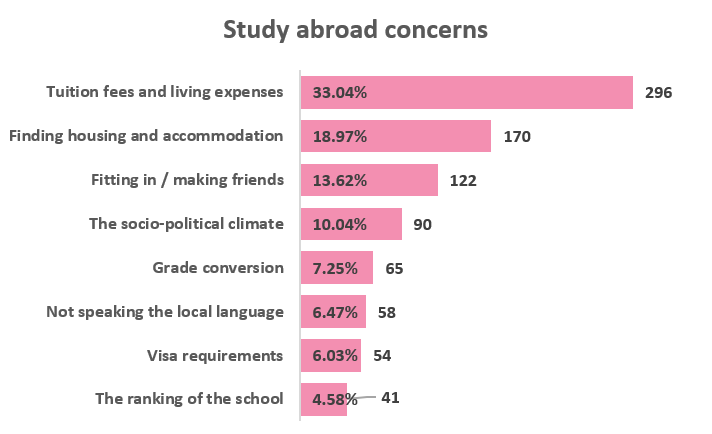
Source: International Higher Education Survey: Student Insights 2020
One way for universities to assuage cost concerns is to highlight any available scholarships or financial aid. The effectiveness of this strategy can be seen as scholarships and funding information is the most helpful factor (16%) that helps Malaysian students decide where to study abroad.
Most Helpful Factors for Malaysian Students
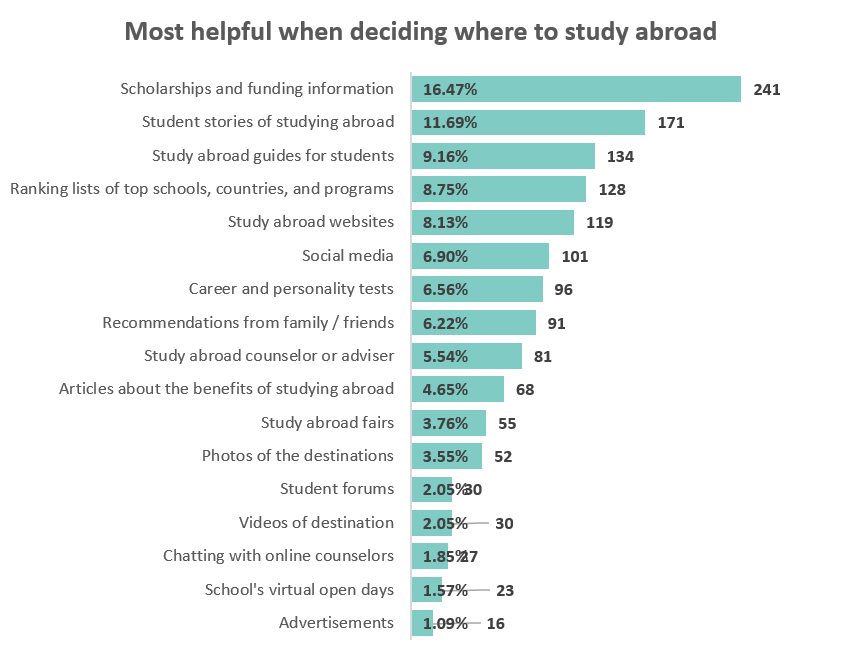
Source: International Higher Education Survey: Student Insights 2020
Another tactic for universities is to observe how their competition is addressing Malaysian students' cost concerns. Other than public universities, there are numerous private higher education institutions across Malaysia.
Some private universities collaborate with foreign universities to provide twinning degree programs which usually take the form of “2+1” or “3+0”. This means that students would spend either 2 years in Malaysia and 1 year abroad (“2+1”) or 3 years in Malaysia (“3+0”) or some other variations.
Some foreign universities, mostly from Australia and the United Kingdom, have also set up branches in Malaysia.
These innovative solutions mean that students can obtain a quality education offered by these foreign universities while saving on tuition and living costs.
4. Build Trust With Word-of-Mouth Recommendations
Malaysia is a word-of-mouth market, and university recruiters can use a range of tools to generate word-of-mouth excitement and build relationships with prospective students and parents.
A study by Nielsen shows that 86% of Malaysian consumers place the highest level of trust in word-of-mouth recommendations. This trend is supported by our survey findings where Malaysian students rank student stories of studying abroad (12%) as the second most helpful factor in helping them decide where to study abroad.
The mastering of digital marketing techniques including the use of social media will help university recruiters tap into the power of word-of-mouth recommendations. Additionally, university marketers can undertake proactive personal engagement to maximize word-of-mouth recommendations.
In-person interactions - for example at education fairs, or guest lectures - are invaluable in establishing trust and building relationships with prospective students and parents. Credible advocates such as university students, alumni and academic staff can be engaged to build trust and amplify the university recruitment message.
In order to craft effective recruitment strategies, university recruiters would need to understand the complex intersection of factors that affect Malaysian students’ decision-making processes to study abroad.
Download our free International Higher Education Survey: Student Insights 2020 today to get targeted breakdowns of current and prospective students’ trends that can help you develop a successful marketing strategy!






%20-%202.png)

